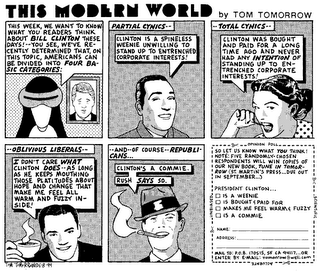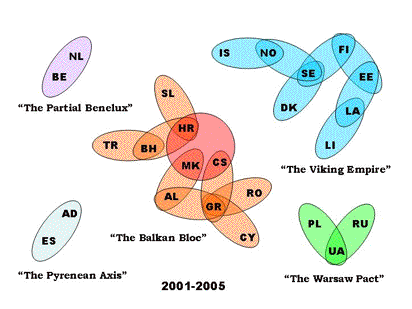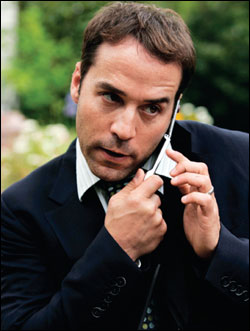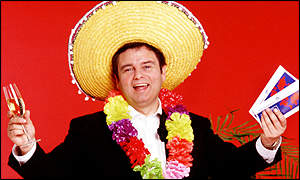Tuesday, May 30, 2006
Friday, May 26, 2006
today : for sale. the perfect invention
 So anyway I was filling up my car. It was cold and rainy. I'd already waited for several minutes while the car in front sat idle until it's owner had queued up and paid. I noticed the person was browsing for magazines and sandwiches and I was in a hurry. When I got out the cold wind was biting. I have a a little arthritis in my hands - just enough to make gripping a petrol pump in the cold slightly less than easy. I only had ten pounds in cash and had to squint through the rain on my glasses to make sure I didn't run over and end up spending too much.
So anyway I was filling up my car. It was cold and rainy. I'd already waited for several minutes while the car in front sat idle until it's owner had queued up and paid. I noticed the person was browsing for magazines and sandwiches and I was in a hurry. When I got out the cold wind was biting. I have a a little arthritis in my hands - just enough to make gripping a petrol pump in the cold slightly less than easy. I only had ten pounds in cash and had to squint through the rain on my glasses to make sure I didn't run over and end up spending too much.So here is my solution - an invention that solves all my problems of that morning. The triggerless petrol pump. All you do is put it into your tank. The pump nozzle has an electronic rather than mechanical trigger - a button on the top, or even better on the actual pump stand. It's heated.
Instead of having to watch a too-small LCD display, trying to put ten quid in instead of £10.01, the pump has a selection of big buttons, like a phone or a till. You simply press the amount you want £10, £5 or "fill tank". If you want to put a specific amount in, then there is a number key pad, like on an ATM, where you can choose.
As soon as you press Enter the pump automatically sets off. You don't have to wait around with your hand on the trigger. By the time you are inside the shop, your car has been filled automatically. It speeds up the throughput so that at busy times, other people have to wait less. You take the nozzle out of your car when you get back. Everyone is happier.
Why do the oil companies still operate on such outmoded technology? It's not like they don't have the cash for research and development. Everyone needs fuel for their cars and the prices are pretty uniform - the competition lies in other areas. Customer service, waiting times, whether you freeze to death whilst filling up, and ageing population with arthritic hands, sheer laziness.
My invention solves them all, and I am willing to let any of the major oil companies have it for about £20 million
Tuesday, May 23, 2006
today : our survey said...
 I'm always very suspicious of think tanks, surveys and polling organisations. They seem to come up with loads of 'facts' - the basis of which they don't really explain to my satisfaction. The other day I heard that street markets are 50% better than supermarkets, back injuries cost British business £90 million a year, the World Cup will cost employers £300 million due to people skiving and that 57% of people think that immigration is a huge issue.
I'm always very suspicious of think tanks, surveys and polling organisations. They seem to come up with loads of 'facts' - the basis of which they don't really explain to my satisfaction. The other day I heard that street markets are 50% better than supermarkets, back injuries cost British business £90 million a year, the World Cup will cost employers £300 million due to people skiving and that 57% of people think that immigration is a huge issue.In fact the only honest fact I've heard recently is the Head of Immigration who said he had no idea how many illegal immigrants are in our country. People slated him without ever stopping to realise that the undocumented is by it's nature an unknowable thing. Basically he was admitting that any figures were guesses. Now there's honest for you.
Because of all this I have decided to set up my own think tank/polling/survey organisation. It's called the SRI (Saltydog's research institute) My first poll was conducted today and I asked lots of questions to examine the social and political currents in my house.
Q1. If there was an election tomorrow, who would you vote for?
A Labour 100% all other parties 0%
Q2. Do you support the United States president?
A. No 100%
Q3. What is the cost of missing work through back injuries ion the past year?
A. Nothing
Q4. Where do you shop?
A. The shops.
Q5. How much would you consider immigration as a cause of concern?
A. Not at all. I never worry about it.
Q6. How well off do you feel?
A. Very poor
Q7. Are you satisfied with the National Health Service?
A. As a whole: yes. In the specific case of my wrongly diagnosed ankle injury: no.
On a serious note the immigration poll was actually instigated by BBC news. It was their main headline on TV tonight. Is that really news, or is it the arbitrary creation of news as a reflexive response to other media who have vested interests and clear political agendas?
The real question; the one asked by the SRI is:
Q How sick are you of people conducting simplistic polls on complex issues and then reporting the headline results as news and fact, when it's actually shot through with bias and opinion?
A Very, very sick.
Saturday, May 20, 2006
today : The s'dog's Eurovision betting tips
 Hurrah! It's Eurovision tonight. That pan european metaphor for the diplomatic conditions within the greater European family of nations. . I am writing this before the contest has even begun, and even though many people believe it is the turn of one of the more 'traditional' countries to win, I predict that the contest will be won by one of the Balkan Bloc countries.
Hurrah! It's Eurovision tonight. That pan european metaphor for the diplomatic conditions within the greater European family of nations. . I am writing this before the contest has even begun, and even though many people believe it is the turn of one of the more 'traditional' countries to win, I predict that the contest will be won by one of the Balkan Bloc countries.If the contest winner is to move back north and west then the best bet is on the Viking nations. Norway would be a good outside bet. Finland being my preferred guess in this scenario, although whether their Satanic Death Metal entry will have cross European appeal (especially amongst the more Orthodox and Catholic states ) is worriesome.
However, given that Bosnia and Croatia may still divide some loyalties, what with the recent death of Milosevic and the national voting arguments, my prediction for an outside bet is newcomers Armenia (not, sadly, represented by System of A Down), with an each way chance on Moldova or Macedonia.
Friday, May 19, 2006
today : dark edgy and cool. Yeah!
 Please read this piece of writing because it is, I promise, dark and edgy.
Please read this piece of writing because it is, I promise, dark and edgy.Except that is a lie. It isn't dark or edgy at all. Or maybe it is. I dunno. The thing is: dark and edgy are two of the most over-used and empty adjectives in current use.
The problem lies in the fact that the taste-makers and the literati are caught up in an endless cycle of trying to outcool each other. Which is ironic, because like many other things, cool - the definition of something you cannot contrive - has become yet another contrived quality that we are shrilly and most often fraudulently told to ascribe to films, TV shows, books and music by these self-nominated cultural prophets.
Telling someone that a film/book/record/TV show is cool is the equivalent of someone at a party insisting they are crazy and hilarious. Invariably they are actually an insecure unfunny buffoon. Or someone insisting they are a people person, which is a sure fire indicator of the fact that they are tiresome and shallow with the social skills of George Costanza. In short : it's spin.
Somehow darkness and edginess has become an indicator of both cool and quality. If something isn't dark or edgy it is almost an embarassment to like it.
Years ago, when I was about 23, I wrote a novel. It wasn't a very good novel, but was my attempt to write a love story influenced by Eastern European authors whose names began with a K, like Klima and Kundera. I remember describing it to someone of my acquaintance. It was set in an unnamed European city and featured a group of characters, each of which was involved in a love story of a kind. Some were unconventional, some platonic, some passionate and some merely inevitable. Just on the basis of my description, my acquaintance declared my project boring. This was pretty impolite. I described some of the individual tales that made up the story. An old man mourning his wife of fifty years who finds new purpose in a young woman who assumes the role of the daughter he never had; a philanderer who longs to settle down and finds himself trapped into a relationship that is loveless but safe; a strange and lonely middle aged guy who falls in love with a call girl and finds redemption in his attitude towards women; an artist who seduces his patron's daughter and their defiance of his disapproval. My acquaintance made some plot suggestions. Perhaps the middle age guy could accidentally kill the whore whilst engaging in S&M, the old man could impregnate the daughter figure and then force her to have abortion, the philanderer could escape his safe, loveless relationship by framing his girilfriend for fraud and watching her go to gaol and the artists and his muse could plot to murder her father and inherit his fortune. In short, someone who had never and probably would never write a novel wanted me to re-write my novel so that it's themes reflected his obsessions - which on reflection were pretty unpleasant greed fantasies and mysogenist tosh (just as an afterthought, this was guy whom, I found out later, made his girlfriend sleep in a separate room during her periond!?).
This guy was a type. One of those people who are embarrassed and obsessed about appearing uncool. He liked his cultural artefacts edgy and dissed anything that wasn't dark and cruel. He wouldn't even consider a PG certificate film because it was clearly not adult enough and he thought American Psycho was the best book ever, whilst actually being clueless about that novel's rather unsubtle symbolism. He didn't like pop music, decrying his favourite bands the moment other people had heard of them. If he was caught liking anything mainstream, it was explained away by the fact that he was being ironic and all-knowing. He liked his rock stars dead by suicide and drugs, his books underground, his comedy offensive and his films obscure and censor-worrying.
The cult of edginess and darkness has taken over. I guess over time everything becomes more extreme. Now people are basing entire works of art on their edginess and darkness, and people have started to believe that if something lacks edginess and darkness then it simply isn't worth it.
Tuesday, May 16, 2006
today : misunderstoodings
 Every pedant knows that when Juliet asks 'wherefore art thou Romeo?' that firstly, she is speaking rhetorically and that secondly she is NOT - I repeat not! - asking him where he is. The clue, as every pedant knows, is in the 'fore' bit on the end of the word 'there', which distinguishes it from the word 'there' by adding some extra letters i.e. F.O.R.E. If Romeo were to answer "Over here" as he often is jokingly misquoted as doing, he would be elliptically implying that his name was not Romeo but actually Overhere. And that's such a daft name that not even ChrisandGwynny would call their child that.
Every pedant knows that when Juliet asks 'wherefore art thou Romeo?' that firstly, she is speaking rhetorically and that secondly she is NOT - I repeat not! - asking him where he is. The clue, as every pedant knows, is in the 'fore' bit on the end of the word 'there', which distinguishes it from the word 'there' by adding some extra letters i.e. F.O.R.E. If Romeo were to answer "Over here" as he often is jokingly misquoted as doing, he would be elliptically implying that his name was not Romeo but actually Overhere. And that's such a daft name that not even ChrisandGwynny would call their child that.Language, as Steven Pinker or Noam Chomski might say, is often completely crackers. More importantly, people spend much of their time just wilfully not listening to anything anyone else says. How else can you explain those people who refuse to believe Simon Cowell when he says that their caterwauling audition was truly terrible and that they are not actually going to Hollywood?
There's a lot of tabloid Daily Maily kind of anger around in Britain at the moment about criminals. It's the perennial 'debate' that the papers bring up when they want to chip away at the government. Criminals and immigrants are always the pressure point. It's actually an early sign that the Right Wing press are seeing the possibility that the Cameron led Tory party might win next time. It's the start of the campaign, where the seeds of discontent are planted over issues that are pretty much unresolvable and it deflects away from the real issues.
Sentencing is a key issue here. People get very upset over the fact that criminals don't ever serve their full sentence. They do, of course. But nobody seems to explain to the general public that a 'sentence' doesn't only mean prison. If someone gets a ten year sentence, it might be that five years of it is spent in prison and five years spent out of prison under probation and supervision. If sentencing was worded thus: "you will spend five years in prison and five years on probation", then everyone would understand the nature of sentencing and nobody would be able to complain and therefore engage in what is essentially a bogus debate.
The world is full of stuff that just isn't explained properly. Finance and economics for example. When the financial news comes on and talks about long bonds and interest rates and exchange rates and money supplies and whatever none of it is ever explained. Now I am one of those nerdy people who read books about economics and what-not, so I understand what all those figures are that pack the screen on MSNBC and Bloomberg mean, but your average person, I'll wager is completely confounded. I think that in this case the non-explanation is deliberate. The rich just don't want everyone else to know that:
a] it's all smoke and mirrors and
b] whatever happens, they are fleecing us to make themselves richer
But my main point here is that when people DO bother to listen, often the explanations are inadequate, or completely misinterpreted. We could come up with loads of examples. My current bug-bear is Darwin. He was writing over a century ago, so language hasn't changed too much (unlike in the King James Bible phrase 'suffer the little children', which needs a major translation because it actually has nothing to do with the pain and suffering of children, but is an entreaty from God for people to 'allow' children to go to Him, because in 1601 the word suffer meant 'allow'). But it has changed a bit, and Darwin needs to be slightly translated. When he wrote the phrase 'survival of the fittest' he was talking about how genetically the 'most appropriate' organism for the environment is the one that survives. Yet each time I hear the phrase it has been both misunderstood and misused. Especially in business. It's a cliched excuse that currency trader types use for being odiously aggressive. He was NOT talking about survival of the most macho and people who go to the gym most often.
So, I ask, wherefore do people misunderstand? It is because only fittest language should be used when explaining problematic concepts. On the off chance that people are listening, we should suffer them to understand.
Sunday, May 14, 2006
today : richie cunningham: the devil?
 Hello Catholics and religious people everywhere. Just a reminder for you : The DaVinci Code is a made-up story. Surely you remember when you were at little school and the teacher sat the class down and read stories to you like Dr Zeuss or Roald Dahl. It's like one of those, except longer and with fewer pictures. C'mon, you must remember. Didn't you ever have to learn that fiction is made up and non-fiction is true?
Hello Catholics and religious people everywhere. Just a reminder for you : The DaVinci Code is a made-up story. Surely you remember when you were at little school and the teacher sat the class down and read stories to you like Dr Zeuss or Roald Dahl. It's like one of those, except longer and with fewer pictures. C'mon, you must remember. Didn't you ever have to learn that fiction is made up and non-fiction is true?(note to postmodernists : yeah, I know that the above statement is really very debatable, but just for the sake of argument let's stick to the true/made up distinction because some of these Religious people don't seem to be at that level yet)
That's why Dan Brown's NOVEL is shelved in the 'fiction' section part of the bookshop rather than the 'totally utterly and irrefutably true' section.
As far as I can gather, this IMAGINARY TALE features some imaginary characters investigating some imaginary stuff in a mixture of real and imaginary up places. Why are you so confused?
Maybe it is just sheer arrogance. After all, your campaign of proving the novel is UNTRUE is predicated on the belief that everyone who reads this FICTIONAL work believes it is actually true. Well, I haven't done a survey but I guess if I did I'd find that almost 100% of people who read books CAN read, and that maybe at least 70% of those people understand the difference between things that are imaginary and things that are true. And if they do decide that whatever 'heretical' nonsense is contained in this story might be plausible then they were probably not thinking about taking holy orders anytime soon anyway.
Can I suggest that you stop wasting your energy and use it doing something useful, like resolving the issue of AIDS and condom use to, y'know, kinda stop MILLIONS of people dying.
Oh, and by the way. As far as I can gather, your Church appears to have survived for a coupla thousand years so far, despite the best efforts of THE DEVIL. So I'll take a long shot here, and guess that 'A Ron Howard Film' just might avoid bringing down the entire faith system upon which the whole of Western morality is based. After all, Night Shift starring Henry Winkler didn't, as far as I understand, turn everyone into pimps.
Wednesday, May 10, 2006
today: When you wasn't famous...
 ...you was actually quite interesting.
...you was actually quite interesting.Don't get me wrong. I like The Streets. I thought Dry Your Eyes was a deserved number one record. It was poignant. But recently I had to review the new album and found it very annoying.
The problem is this: art by artists about artists and their art is boring. Oh, I know that in the visual arts especially, lots of art is about the creative process and pretty much any non-realistic painting is all about the plastic qualities of paint and canvas and the way people interpret the world and all that.
But what I'm talking about is that peculiar category of art and culture that concentrates on the strife and suffering of rich and famous stars. I'm not even averse to things that explore the nature of fame and success. It is conceited navel gazing that I can't be doing with. Films about films, rock music about rock music, books about writers - they all bore me to tears.
Where The Streets is concerned, we could actually identify with the everyday in Mike Skinner's songs. But now the only thing we can do is interpret his music like we might interpret a celebrity gossip mag. I wonder which pop star he shagged? Poor him. He has groupies and a gambling habit. He drinks brandy to bring him down from the coke. It's the urban equivalent of guitar wielding rock stars who write songs about how all the hotels and the towns and the venues look the same. I don't know how many of those songs I've heard throughout my life, but it is about 100% too many.
Similarly, I'm just not really interested in how difficult and tortuous it is to make a film. If it's that hard then don't bloody make it. I don't care about the monster egos of Hollywood. The Player, rather than being a savage satire on the mores of Hollywood, is actually a crashingly obviously bore. If you're the guy in Swimming with Sharks who gets bullied and abused by his boss then you walk after about a week and, thankfully for the rest of the world, the film doesn't ever get written.
Of course, a rule can't be a rule unless there are exceptions. Entourage, for example. However, it's not really a tale about Hollywood insiders. It's a tale about Hollywood outsiders. We see the world though Eric's eyes and he recognises the foolish absurdity of it all. Jeremy Piven's Ari is also a brilliant and finely judged character, making an egomaniacal monster into a (sym)pathetic human being.
The problem is this: art by artists about artists and their art is boring. Oh, I know that in the visual arts especially, lots of art is about the creative process and pretty much any non-realistic painting is all about the plastic qualities of paint and canvas and the way people interpret the world and all that.
But what I'm talking about is that peculiar category of art and culture that concentrates on the strife and suffering of rich and famous stars. I'm not even averse to things that explore the nature of fame and success. It is conceited navel gazing that I can't be doing with. Films about films, rock music about rock music, books about writers - they all bore me to tears.
Where The Streets is concerned, we could actually identify with the everyday in Mike Skinner's songs. But now the only thing we can do is interpret his music like we might interpret a celebrity gossip mag. I wonder which pop star he shagged? Poor him. He has groupies and a gambling habit. He drinks brandy to bring him down from the coke. It's the urban equivalent of guitar wielding rock stars who write songs about how all the hotels and the towns and the venues look the same. I don't know how many of those songs I've heard throughout my life, but it is about 100% too many.
Similarly, I'm just not really interested in how difficult and tortuous it is to make a film. If it's that hard then don't bloody make it. I don't care about the monster egos of Hollywood. The Player, rather than being a savage satire on the mores of Hollywood, is actually a crashingly obviously bore. If you're the guy in Swimming with Sharks who gets bullied and abused by his boss then you walk after about a week and, thankfully for the rest of the world, the film doesn't ever get written.
Of course, a rule can't be a rule unless there are exceptions. Entourage, for example. However, it's not really a tale about Hollywood insiders. It's a tale about Hollywood outsiders. We see the world though Eric's eyes and he recognises the foolish absurdity of it all. Jeremy Piven's Ari is also a brilliant and finely judged character, making an egomaniacal monster into a (sym)pathetic human being.
Tuesday, May 09, 2006
today : Best of British pt1
 Of all the things about being British that I don't like, the weather is the main one. Yesterday it was gloriously sunny. I watered my plants and hung out the laundry before nipping out to the local Asda for some supplies. Almost as soon as I set off, blobs of rain appeared on my windscreen. By the the time I came out of the supermarket clutching a carton of milk and a pack of Camels it was tipping down. I rushed home and dashed outside to bring in the laundry before it got so soaked I would have to spin it again. As soon as I had grabbed the last thing off the line, the rain abruptly stopped and the sun came out again. This is the kind of thing that Alanis Morrisette would understand as ironic, when of course it was just rotten timing and me not looking at the weather forecast which said sunny periods with sharp showers. Sometimes I long to live in California, where it is apparently a mean 70 degrees all the time. I even mind living in the tropics where you know that it will bucket down at 3pm every day. Predictability is the key issue here.
Of all the things about being British that I don't like, the weather is the main one. Yesterday it was gloriously sunny. I watered my plants and hung out the laundry before nipping out to the local Asda for some supplies. Almost as soon as I set off, blobs of rain appeared on my windscreen. By the the time I came out of the supermarket clutching a carton of milk and a pack of Camels it was tipping down. I rushed home and dashed outside to bring in the laundry before it got so soaked I would have to spin it again. As soon as I had grabbed the last thing off the line, the rain abruptly stopped and the sun came out again. This is the kind of thing that Alanis Morrisette would understand as ironic, when of course it was just rotten timing and me not looking at the weather forecast which said sunny periods with sharp showers. Sometimes I long to live in California, where it is apparently a mean 70 degrees all the time. I even mind living in the tropics where you know that it will bucket down at 3pm every day. Predictability is the key issue here.Yet there are many things about being British that are excellent.
1. Swearing and sex on the TV. We love it. Yet we don't go over the top. Generally the swearing and sex on TV isn't about tittilation (unless if you go looking in the outer reaches of late night cable). If a drama requires lots of swearing, there is lots of swearing. If nudity is required, then people get their kit off. It's all very grown up and we don't really get our knickers in a twist over it. If people don't like bare skin and real language, then they don't appear to form pressure groups and rant about the moral corruption of civilisation. They turn off.
2. Pop music. We have the best. That's it.3. Football. We also have the best. Last night's Championship playoff semi-final featured Leeds and Preston. As well as winning, the Leeds team sustained nine bookings and two sending offs. Now that's real sport.
Monday, May 08, 2006
today : if you gotta go, oh...
 I can't believe they didn't see it coming. I can't believe they allowed it to happen. They opened the Pandoras Box and now I fear they will never manage to jam the lid back on.
I can't believe they didn't see it coming. I can't believe they allowed it to happen. They opened the Pandoras Box and now I fear they will never manage to jam the lid back on.In 1997, when Labour came to power I was stunningly impressed by their ability to avoid the pitfalls of government. They appeared to have learned from the Tories and were putting those lessons to exemplary use.
But now it's all a mess. Forget the fact that people have been caught with their pants down, that there are whiffs of incompetence. All governments run into trouble - that's the nature of huge organisations. The mess is merely a strategic one, borne of one error.
Whoever advised Mr Blair to signal his intention to stand down made a basic and fundamental mistake. It immediately put blood in the water. They forgot that to maintain power and popularity you have to play a three dimensional strategy with short medium and long games. You must also factor in all the variables and certainties.
Now I can't believe that nobody realised this. Actually, change that. I can believe that nobody realised this. As far as I can gather, the qualification to be a close adviser to the government is where you went to school and university, not whether you have political strategic experience and/or wisdom. I guess if you are twenty five it's really difficult to a. remember mistakes made in the past or b. picture what ten years might look like. After all, ten years ago you weren't worrying about wars and refugees or economic strategy, you were worried about passing your grade four piano exams and the fact that you have a date on Friday and a pimple on Thursday.
To announce a finite premiership for Blair was to keep the fires of rebellion smouldering. It was a poor long game strategy. Forget the Brownites, there always were fifty or so MPs who were only grudgingly part of the New Labour Project. These same fifty or so were easily hidden in a massive majority and seemingly forgotten about. They are also probably the same ones who are professional MPs but serial underachievers, fearful of losing their power and position. They were primed to attack whenever the opportunity arose. The strategists forgot this and didn't remember how even the Thatcher loyalists stabbed their heroine in the back when they were cornered and felt threatened by the fear of being voted out..
The seond thing the strategists forgot is that, however it looks, the establishment just doesn't like the labour party. Even in its centre right incarnation it is still a little too left wing for comfort. They only like power that is based in protecting their wealth and influence. At best, they put up with New Labour. Characters like Murdoch courted Blair, but actually it was the other way around. Blair (and Brown) courted them in the face of threats of non-endorsement. The project was to keep Labour on their side until their preferred option - The Tories, whose core value is maintaining the wealth and power structure - were rebuilt.
I have already written about how politics is Tv these days and has to behave according to the same rules. You would not announce that Gandolfini was going to leave the Sopranos towards the end of next season. It'd spoil the surprise. The press would look for signs of his performance winding down and speculate on the way that he would be killed off. Talk amongst the acting community would be of who might replace him. And when. And how.
The short game is to deflect crises. These always arise. But Blair now has a constant undertone beneath the daily tune of his short game. When will he go? Will this be the tipping point? Maybe we can make it happen now? - that'd be a good story.
this weeks crap thing on every level is...

Root canal.
I am not bothered by the dentist (in fact, my dentist is a nice chap who even has right on political views) but root canal is about the horrid burning smell of dead and dying soft tooth tissue being drilled, the feeling of having the nerves ripped out, the endless scraping and twisting. It is underpinned by the notion that this procedure means you are getting old and are one simple step away from losing a tooth and turning into Steptoe or Shane MacGowan
There is nothing good about it at all.
today : on Capote
 Oscar winning films. I tend to shy away from them. When the hype is all around I generally avoid seeing them at the cinema and sometimes I don't watch them for at least a couple of years after they were feted. For instance, I only recently watched Hotel Rwanda, which incidentally I thought was excellent. But on the whole most Oscar and awards-laden films turn out to be not quite as good as they were painted at the time. A great example of this is American Beauty, which is a well made, well acted and an almost utterly predictable and shallow experience. The test of whether it is truly engaging is that in many scenes you find yourself going "That's Chris Cooper! And Look, it's CJ Cregg!" Satire of modern life used to mean Norman Mailer or Joseph Heller. Now we have the towering talent of Alan Ball. Oscar for lighting design maybe.
Oscar winning films. I tend to shy away from them. When the hype is all around I generally avoid seeing them at the cinema and sometimes I don't watch them for at least a couple of years after they were feted. For instance, I only recently watched Hotel Rwanda, which incidentally I thought was excellent. But on the whole most Oscar and awards-laden films turn out to be not quite as good as they were painted at the time. A great example of this is American Beauty, which is a well made, well acted and an almost utterly predictable and shallow experience. The test of whether it is truly engaging is that in many scenes you find yourself going "That's Chris Cooper! And Look, it's CJ Cregg!" Satire of modern life used to mean Norman Mailer or Joseph Heller. Now we have the towering talent of Alan Ball. Oscar for lighting design maybe.On second watch I was not sure I liked Capote as much as on first watch. Like everyone, I think, I was initially mesmerised by Philip Seymour Hoffman's central performance. It was one of those roles that fell together perfectly. Nobody else alive could have played it. It was one of those, that from the very idea, was his awards season performance. Everyone likes him and even in duffers like Along Came Polly he puts in a terrific turn. Capote was the role that meant people felt justified in giving him a prize, because we all know he's brilliant.
The problems in the film lay, I think, in the pacing. How difficult it always is to portray writing without resorting to cliches. However, I felt that the film could have been slightly pacier and actually longer than it was. Because the film was keen to compress a number of years, the failing relationships with both Jack Dunphy and Nell were skated over somewhat. I got little sense of Nell and Truman's real closeness apart from the the early scenes when they laugh conspiratorially together at Truman's jokes, when, it could be argued, this was one of the central relationships in modern literature. That two next door neighbours could both produce staggeringly good writing is almost unbelievable. I want to know more about how that could be.
On second viewing, Hoffman's performance is still brilliant. But it towers so far above the rest of the film that it eclipses everyone else. To be harsh - the other performances are merely functional. It takes a lot to eclipse Catherine Keener, but her Nell appears small and uncomplex. Clifton Collins is also forgettable as Perry Smith. I found myself bored by his meaningful nasal breathing and long pauses - something that Hoffman manages effortlessly because he acts the pauses as well as he acts the lines. He didn't really give off the ambiguity acribed to him in the film - both as an object of desire and as a sensitive man who could kill at a moment's notice. How brilliant would a young Sean Penn have been in the role, or Edward Norton? Similarly Bruce Greenwood, who is too familiar an actor of mini-series status to add any real gravitas to Jack Dunphy.
Lastly, the music was poor. Screechy violins - not to my taste. Too unmemorable. I would have liked to see a simple contrast in music. i.e. music for Truman's life; no music for things that are reflections of the novel. The hanging scene would have been so much more powerful without incidental music. It was the perfect non-fiction moment in the film and did not need adornment. I also found the central argument of the story a little simplistic. If anything, I wanted a much broader canvas. Capote the writer, as well as Capote the celebrity deserved more exploration.
Monday, May 01, 2006
this week's rubbish thing on every level is...

The BBC1 Lottery Show.
Since we had the lottery, the BBC has tried to create a show around it. Each show has been rubbish on every conceivable level. An endless stream of third rate presenters presenting fourth rate variety and game shows. It has taken over from Songs of Praise as TV's dead hour. Other Tv channel controllers dance around and rejoice whenever they think of how they almost bid for the rights.
Even now, people are only interested in the numbers to see if they are a millionaire or not. And by the way nobody gives a stuff if the machine is called Guinevere and the set of balls is number three. What is that about?. Just hurry up and tell me the bloody numbers!
today : why we should worry about the BNP
 A few weeks ago I made a statement that was pointed out as being racist. Or potentially perceived as racist. I was teaching and , in the afternoon, a couple of Afro-Caribbean boys arrived back in class in a giggly, distracted mood. I suggested to my co-teacher that they'd been smoking a bit of weed at lunchtime. A black guy who was assisting us pulled me up on it.
A few weeks ago I made a statement that was pointed out as being racist. Or potentially perceived as racist. I was teaching and , in the afternoon, a couple of Afro-Caribbean boys arrived back in class in a giggly, distracted mood. I suggested to my co-teacher that they'd been smoking a bit of weed at lunchtime. A black guy who was assisting us pulled me up on it."Why assume they smoke weed just because they're black."
Of course, I was only making the connection between them smoking weed and being sixteen. I thought nothing of their race or colour.
But on the way home I started wondering if I actually had, unconsciously, made some connection between their race and their possible leisure activities. Maybe I did. Maybe if they had been white I would have accused them of drinking alcopops. I don't think I did. For the record they took about 15 minutes before they calmed down and got on well with their work.
I live in a part of England with a high immigrant population. When it comes to election time - like this weeks local elections - there is always the possibility that I will encounter racist politics. In fact I drove past a house the other day that was flying the Union Jack flag. In the USA flying the flag is fairly normal and often indicates nothing more than pride. In Britain, the Union Jack is used as a symbol of extreme nationalism (as opposed to the Cross of St George - the English flag which used to be the same but is now used as a symbol to show your support of the football team).
My area is where the British National Party tend to focus their activities. Occasionally one of their number will be elected to a local council. It is deliberate. The post-industrial North has a significant Caribbean and Indian sub-continent population, coupled with low levels of affluence and large patches of poor education. In short, it is a fertile breeding ground for the politics of hatred. The BNP exploit this. In recent years they have tried to smarten up. Their leader - Nick Griffin -portrays himself as a serious politician (despite his past convictions for racist attacks) and they are careful to appear suited and smart whenever they appear on the TV. They also play the fairness card, demanding to be given their fair share of media time and coverage. They have softened their views too. They no longer demand forced repatriation of all non-whites. Their policy now encompasses voluntary incentivised repatriation. The picture above is taken from the BNP web-site, a perfect illustration, despite their protestations of seriousness and maintreamness, of what they are really about.
What confounds me is that certain parts of the media seem to give them lots of coverage. For a party that is only contesting only a few of 3000 council seats their coverage is out of proportion. Last week one of the right wing papers published a survey that said a huge majority of British people share many of their views with Nick Griffin and co. Just yesterday I watched a feature on Sky News that dealt with the hoary old race/IQ debate. Someone somehere seems to think their views deserve a platform.
The problem is that I can easily believe the surveys. I hear casual and unthinking racism all the time from all areas of my acquaintence. Much of it is not mean or deliberate, but that's not the point. I'm someone who will argue back and refuse to listen to racism. It has caused me trouble sometimes and led to ugly scenes. Yet even I may have made a stereotyped racist assumption about the two black boys in class.
Practically we must stop the BNP. Plenty of people I know are like myself, aware of the problem, beyond a point where they see colour pejoritively. I worry that we might give in to complacency. We are not, as a society or a world far enough past simple xenophobia that we can give up fighting. Changing attitudes is still a difficult ongoing project and we cannot afford to slack off. The BNP will win some of their seats on Thursday by exploiting peoples' basest instincts and also by lying and misleading carefully targeted blocks of voters. Suddenly 20% of the population will be without representation. It's reminder that the ice is still thin. We aren't anywhere as near as we'd like to a moderate and tolerant society.
Subscribe to:
Comments (Atom)
